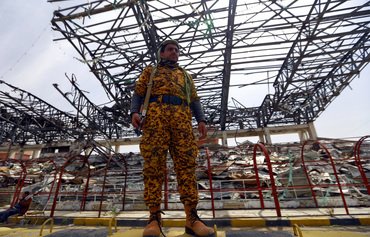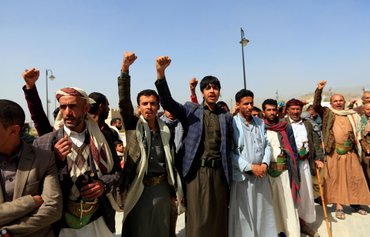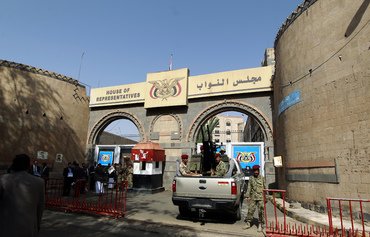ADEN -- The ongoing campaign by the Houthis of attacking the homes of their opponents, as part of a strategy to intimidate and terrorise civilians, is drawing increasing rebuke and disgust.
Within a recent two-week period, the Houthis blew up the Marib and al-Bayda province homes of four of their opponents.
On July 30, the group bombed the house of Marib resident Abed Muhsen al-Dahshami al-Muradi.
A day earlier, the group targeted the house of Brig. Gen. Talib Derkom in Baqtha al-Olya in Marib's Murad region, a few days after bombing the house of his brother, Brig. Gen. Ahmed Derkom, emergency police chief in al-Bayda.
![Smoke billows behind a building in Sanaa on December 2, 2017, during clashes between the Houthis and supporters of Yemeni ex-president Ali Abdullah Saleh, days before Saleh was killed. [Mohammed Huwais/AFP]](/cnmi_am/images/2021/08/12/31089-Houthis-Sanaa-clashes-600_384.jpg)
Smoke billows behind a building in Sanaa on December 2, 2017, during clashes between the Houthis and supporters of Yemeni ex-president Ali Abdullah Saleh, days before Saleh was killed. [Mohammed Huwais/AFP]
The Houthis also bombed the house of a man identified as Hussain Saleh al-Barmani al-Humayqani in al-Bayda province's al-Zahir al-Humayqan district, local media reported.
Al-Humayqani helped government forces gain control of al-Zahir on July 5, before the Houthis recaptured it three days later, Al-Monitor reported.
The attacks drew official and public condemnation, with Minister of Information, Culture and Tourism Muammar al-Eryani among those condemning the group.
In a statement published in local media, al-Eryani said the Houthis' policy of bombing the homes of political, security and tribal leaders, media professionals and citizens opposed to the group's coup is "a cowardly act of retaliation".
These types of crimes reveal the group's "true face", he said, calling on the international community to condemn these "terrorist acts".
A statement issued by Yemen's Parliament and Shura Council said these actions are an egregious violation of international law, especially the Geneva Conventions and the Rome Statute of the International Criminal Court.
The Civil Authority for Victims of House Bombings also said it considers home bombings a terrorist crime, stressing that the bombings violate all divine regulations and laws, international conventions and treaties and norms.
Campaign of intimidation
By bombing private homes, the Houthis are attempting "to terrorise and intimidate Yemenis so that no one would stand up against their project", said lawyer and human rights activist Abdul Rahman Berman.
Berman said that whenever the Houthis "enter an area and seize control of it, they start bombing the homes of politicians, activists and military and tribal opponents who reject its presence, control and hegemony by force of arms".
The Houthis are by far the worst offenders in terms of the number of house bombings, which they have conducted on a very large scale, he said, even against Yemenis who have had no involvement in the war.
"Bombing their homes is a message to others for the purpose of intimidating and terrorising," he said.
Deputy Minister of Justice Faisal al-Majeedi said the Houthis are "documenting the bombings they carry out, with their slogans featured in them, and they circulate some of them on social media with the aim of deterring opponents".
The Houthis also have been accused of looting and seizing the homes of their opponents.
In one of the latest examples, on June 1, they seized a house owned by Yemeni Satellite Channel director Jamil Ezz el-Din in Ibb province, which is under their control, and kicked out his family.
In selecting a house to attack, said political analyst Mahmoud al-Taher, the Houthis choose a large home, which they regard as "a symbol of belonging to the region and a symbol of stability and wealth for this person".
Targeting the well-off is a deliberate tactic, he noted, and is designed to upend the social structure in the militia's favour, ensuring it keeps the upper hand.
The end goal is to ultimately have two classes left in Yemen, he said, "a class of toiling common labourers and the class of wealthy Hashemites, in order to restore the class system that was the norm during the rule of imams in Yemen".

![A Yemeni man stands next to a building destroyed in clashes between Yemeni forces and Houthi militants in the village of Faw on the road to Marib province, in October 2015. [Abdullah al-Qadry/AFP]](/cnmi_am/images/2021/08/12/31158-marib-houthi-600_384.jpg)







All world countries should reject and condemn this terrorist act. They must fight the Houthis and eliminate them and those who fund them. They're a terrorist organisation supported by Iran and its militias.
Reply2 Comment(s)
The Yemeni people must unite against this terrorist group.
Reply2 Comment(s)